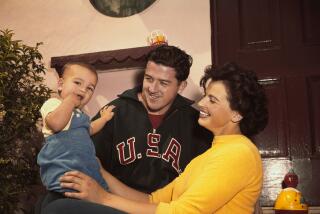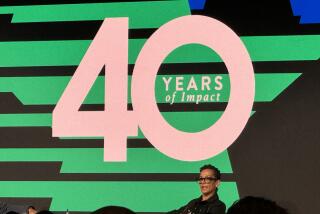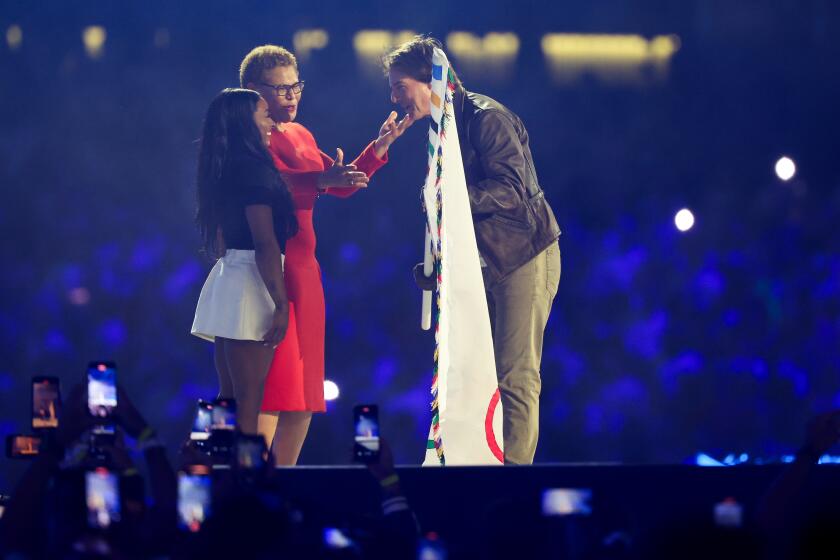A Man of World, and of His Word
When Johann Olav Koss visited Eritrea, an African country torn apart by decades of civil war, he saw the living conditions of the children and promised to return five months later, after the 1994 Winter Olympics. When Koss did return, he marked himself as an Olympic idealist.
When Koss, a Norwegian, won three speedskating gold medals at those Lillehammer Games--in the 1,500, 5,000 and 10,000 meters--and set world records in all three events, he marked himself as an Olympic legend.
In the eight years since then, Koss has marked himself as something much more. He is a modest humanitarian, a man of his word, a physician by training, an altruist by nature.
Now 33 and living in Toronto with his wife, Belinda Stronich, Koss has done what he promised in Lillehammer. He is the head of Olympic Aid, an athlete-driven, not-for-profit humanitarian organization begun originally by the Lillehammer Olympic organizing committee.
“The mission,” Koss said, “is to use the idea of sport and of play to help children in areas where they’ve known only violence and war to develop into healthy, happy people.”
Koss said that Olympic Aid has about 100 volunteers, mainly in Africa and Asia, helping children. Koss himself hopes to visit Afghanistan as soon as possible to institute an Olympic Aid program.
After the ’94 Olympics, Koss donated his gold-medal bonus money to the movement, and returned to Eritrea to present both money and sports equipment he had collected from the children of Norway.
Koss retired from skating after the Lillehammer Games and went to Australia, where he earned his medical degree from the University of Queensland in Brisbane. He had gone to Australia to finish school and to be with his girlfriend at the time.
Koss always kept his hand in Olympic Aid, taking time to speak at fund-raisers and attend committee meetings whenever possible. In 1999, his relationship with his girlfriend over and his medical schooling complete, Koss became the full-time director of Olympic Aid.
He met his wife at an Olympic Aid meeting in London and moved to her home, in Toronto, so he could be with Stronich and her two children.
“Right now,” Koss said, “we are providing sport in the most disadvantaged areas of the world. We are working in more than 15 countries at a grass-roots level. We have been cleared by the United Nations to begin looking for volunteers to bring to Afghanistan.”
Koss has been to Bosnia, flying in a military plane to 1984 Winter Olympic host city Sarajevo; in Rwanda, where war was going on around him, and in Sudan. “I’ve never felt really in danger,” Koss said. “What I felt was love from the children who all seemed to know what the Olympics are.”
Koss is in Salt Lake City doing speedskating commentary for several European television stations. He said that this time, as opposed to 1998 in Nagano, he doesn’t miss competing. “Four years ago,” Koss said, “I did have that big urge to be on the ice. This time? No. Skating is in my past.”
After spraining knee ligaments less than two months before the Lillehammer Games, Koss was not expected to dominate the Olympics. But he did.
Having already set two world records, Koss obliterated the world record in the 10,000. His mesmerizing performance, in which he ticked off 24 consecutive sub-33-second laps, brought the home-country crowd to its feet a minute into his 13-minute 30.55-second race. It also caused the Dutch skaters, big rivals of the Norwegians, to present Koss a golden butterfly after the final race. It is an honor the Dutch always had reserved for Dutch gold medal winners.
Besides his own $30,000 prize money, Koss had his Olympic skates auctioned for $85,000, which he also gave to Olympic Aid.
“Everybody knows the Olympics and the value of the Olympics,” Koss said. “It is an incredibly powerful tool which should be used for good. Through sports we can teach people to understand each other, to build bridges.
“The Olympics should stand for more than excellence every fourth year or every second year. It should provide friendship, respect, peace and good, positive values all the time, everywhere.”
More to Read
Go beyond the scoreboard
Get the latest on L.A.'s teams in the daily Sports Report newsletter.
You may occasionally receive promotional content from the Los Angeles Times.








